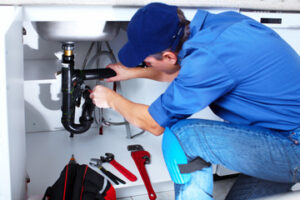The job description for a plumber can be as broad or narrow as the needs of the client. As part of their job description, plumbers install and repair plumbing systems. They troubleshoot malfunctioning systems and repair worn parts. They may cut holes in walls or hang steel supports from ceiling joints to install pipes. Some plumbers also need to solder copper pipes. But no matter what plumbing job you’re looking for, a plumber’s job requires a broad knowledge of building codes and construction.
 Plumbers work in factories and industries. Their duties range from installing toilets and water lines to fixing burst pipes. Plumbers can also work on natural gas lines. They install fixtures, water heaters, and sewer systems. Some plumbers specialize in specific areas, such as installing water treatment equipment. And they also maintain septic systems. That’s not all plumbers can do. It’s an exciting job for people with great mechanical skills!
Plumbers work in factories and industries. Their duties range from installing toilets and water lines to fixing burst pipes. Plumbers can also work on natural gas lines. They install fixtures, water heaters, and sewer systems. Some plumbers specialize in specific areas, such as installing water treatment equipment. And they also maintain septic systems. That’s not all plumbers can do. It’s an exciting job for people with great mechanical skills!
Many plumbers work at different locations each day, including homes, factories, and office buildings. Their work often requires them to stoop and carry heavy objects. Because of these conditions, plumbers are prone to injuries, and they often have to deal with inclement weather. In addition, plumbers often must be available for emergency calls. Self-employment is common among plumbers, and plumbers set their hours and work schedules. Overtime is also common.
Plumbing is a vital part of our lives, not only because it ensures a constant supply of water but also because it helps us manage our water consumption. A working plumbing system is essential to reducing water bills and preventing mold and rot. If you’re a plumber, you’re probably doing more than just fixing faucets. Plumbing keeps everything working properly, ensuring that you never run out of hot water or dirty water.
A plumbing license is required to work independently. Depending on your state, a plumber needs two to five years of practical experience to be licensed to work. United Association provides comprehensive information on licensing requirements in each state. Most plumbing companies have flexible scheduling and low-stress levels, contributing to a happy employee. If you’re thinking about becoming a plumber, keep in mind the following:
When plumbing problems arise, plumbers’ putty comes in handy. It is a soft compound used to make watertight seals around plumbing parts. The plumber’s putty you use should be pliable and easy to roll. If it’s old, it will probably crack when you try to shape it. If you’re not using a plumber’s putty, you’ll have to resort to another method to repair leaks.
The education necessary for becoming a plumber depends on the state that you live in. Most states require that plumbers get on-the-job training. Nevertheless, it’s still possible to earn a college degree through an apprenticeship program. This route involves four to five years of paid experience and extensive classroom instruction in pipe system design, safety, and tool use. Apprenticeship training programs typically last four to five years and require hundreds of hours of classroom study. To become a plumber, you need to be at least eighteen years old, possess a high school diploma, and have reasonable math skills.
Besides math skills, plumbers need to be able to read blueprints and understand their meanings. They need to have good interpersonal skills and be able to work with other construction workers. A plumber must also be physically strong, as they need to lift heavy pipes and crawl into small spaces. In addition, plumbers must have the ability to communicate well with clients and coworkers. They must also be able to work with a wide range of tools, including wrenches and pipe cutters.
Plumbing contractors often specialize in new construction and remodeling. They also have additional training and work for larger plumbing companies. Plumbers own many smaller plumbing companies. Plumbing contractors can handle complex problems, such as installing new plumbing systems. Plumbers may work with plumbing contractors, but they usually lack the training and licenses to handle these tasks. In such situations, plumbing contractors are the best choice. If you want the job done correctly, the plumber will charge you more than a regular plumber.
